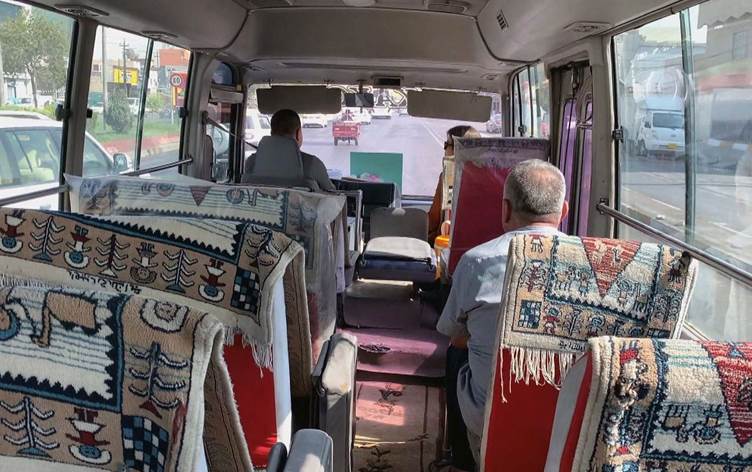Erbil re-launches bus services on 100-meter road

ERBIL, Kurdistan Region – Erbil has re-launched bus services on the 100-meter ring road, six years after they were suspended.
"The two days we have driven around we have had no problems, Alhamdulillah [praise be to God]. The people are encouraging as well. They like it and whoever hops on, thanks us," bus driver Bashdar Rostam told Rudaw's Dlnya Abdulrahman on Monday.
Sixteen buses are operating on the route, going around the 100-meter ring road every ten minutes. A single ride costs 500 dinars (about $0.30).
"These buses are very important and they were brought in at a suitable time, because there were no buses on 100-meter road, only on 40-meter [road]. I use the buses every day because most of us either can't take taxis or walk. That's why these buses are very suitable," said Ayas Ramazan, a university teacher riding the bus.
Erbil is laid out in a series of concentric ring roads — 30-meters, 40-meters, 60-meters, 100-meters, 120-meters, and yet-to-be-opened 150-meters – with the historic citadel at the centre. Erbil has a very poor public transportation system. The city offers a limited bus service and most people use private cars and a large number of taxis to get around. The result is heavily congested roads, lots of car accidents, and pollution.
Around 950,000 vehicles and motorcycles are registered in Erbil, according to the traffic directorate, and the city has more than 1,000 buses, but they are not always popular and the city favours smaller coaster buses over larger vehicles.
"The drivers asked to switch back to coaster [buses] because the buses were big and there were not a lot of passengers. We switched back to the smaller buses, but there were still no passengers," said Luqman Abdulmajid, head of transportation in Erbil.
Bus service on the 100-meter road stopped because of low ridership. "The university students used to use it more, since the Daesh [Islamic State] war and when school hours were reduced they gradually started to stop using it," Abdulmajid explained.
In the past six years, there has been a lot of development around the 100-meter road.
Bus stops are also frequently smashed, falling apart, and littered with trash, but no one wants to take on the responsibility of repairing them.
"There are nearly 300 bus stops in Erbil city center. As the Erbil transportation and communication directorate, we do not carry the responsibility to take care of them," Abdulkhaliq Ali, from the transportation directorate, told Rudaw last year.
Ali says the bus stops were installed in 2014 by a private company on contract to the transportation ministry. "Once they were finished, we handed them over to the municipality," he said. "The municipality and security forces should carry the responsibility to prevent them being smashed or littered in."
"The two days we have driven around we have had no problems, Alhamdulillah [praise be to God]. The people are encouraging as well. They like it and whoever hops on, thanks us," bus driver Bashdar Rostam told Rudaw's Dlnya Abdulrahman on Monday.
Sixteen buses are operating on the route, going around the 100-meter ring road every ten minutes. A single ride costs 500 dinars (about $0.30).
"These buses are very important and they were brought in at a suitable time, because there were no buses on 100-meter road, only on 40-meter [road]. I use the buses every day because most of us either can't take taxis or walk. That's why these buses are very suitable," said Ayas Ramazan, a university teacher riding the bus.
Erbil is laid out in a series of concentric ring roads — 30-meters, 40-meters, 60-meters, 100-meters, 120-meters, and yet-to-be-opened 150-meters – with the historic citadel at the centre. Erbil has a very poor public transportation system. The city offers a limited bus service and most people use private cars and a large number of taxis to get around. The result is heavily congested roads, lots of car accidents, and pollution.
Around 950,000 vehicles and motorcycles are registered in Erbil, according to the traffic directorate, and the city has more than 1,000 buses, but they are not always popular and the city favours smaller coaster buses over larger vehicles.
"The drivers asked to switch back to coaster [buses] because the buses were big and there were not a lot of passengers. We switched back to the smaller buses, but there were still no passengers," said Luqman Abdulmajid, head of transportation in Erbil.
Bus service on the 100-meter road stopped because of low ridership. "The university students used to use it more, since the Daesh [Islamic State] war and when school hours were reduced they gradually started to stop using it," Abdulmajid explained.
In the past six years, there has been a lot of development around the 100-meter road.
Bus stops are also frequently smashed, falling apart, and littered with trash, but no one wants to take on the responsibility of repairing them.
"There are nearly 300 bus stops in Erbil city center. As the Erbil transportation and communication directorate, we do not carry the responsibility to take care of them," Abdulkhaliq Ali, from the transportation directorate, told Rudaw last year.
Ali says the bus stops were installed in 2014 by a private company on contract to the transportation ministry. "Once they were finished, we handed them over to the municipality," he said. "The municipality and security forces should carry the responsibility to prevent them being smashed or littered in."
